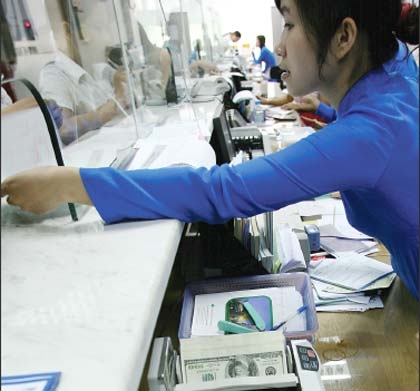Devaluation is seen as benign
Christine Shields, Standard Chartered Bank’s head of country risk research, said up to January 2011, when the Party’s Congress would be held, it would be difficult to make difficult economic decisions and as the new five-year plan would kick into gear in 2011, a period of consolidation was in the pipeline, and some concrete initiatives were expected to incur from the first and second quarter next year.
 |
| US dollars are being traded at the high end of the band |
“There is no visible risk for the country to the end of this year once the world economy continues to grow soundly,” Shields told VIR.
Last month the State Bank devalued the Vietnamese dong via the daily reference rate by 2.1 per cent to VND18,932 per dollar from VND18,544 while maintaining the daily trading band of 3 per cent.
Since the devaluation, the dong has traded around the strong end of the band at VND19,500. The trade deficit has been kept stable for 2010, at around $1 billion per month. Meanwhile, disbursed foreign direct investment reached $7.25 billion and official development assistance with $1.81 billion by August and remittances at $3.9 billion by July, according to Standard Chartered Bank’s latest report on Vietnam- Holding the course dated August, 18.
“Hence, the overall depreciation pressure on the dong ought to be lower than in previous years when inflows were waning on the back of the 2008 global financial crisis while firm domestic demand is absorbing imports,” the report read.
Standard Chartered Bank forecasted that Vietnam’s inflation for this year would be 8.5 per cent and 9.5 per cent for next year, and the VND-USD exchange rate would be VND19,900 in the last quarter of this year, VND20,000 in the first quarter of next year and VND20,400 in the second quarter of next year.
The bank’s forecasted inflation figure was slightly higher against the figure predicted by the Ministry of Planning and Investment (MPI). MPI officials recently stated that inflation would be controlled below 8 per cent this year. This is because the index in the remaining months of this year would not hike too high after posting an increase of below 0.3 per cent in four consecutive months, standing at 5.08 per cent by August in comparison with last December.
However, there are banking issues relating to lending growth rates. The Business Monitor International’s latest Vietnam Business Forecast Report in the third quarter of this year reported that banks were increasingly hungry to lend and the government seemingly less concerned about price growth, after the first drop in the consumer price index in eight months in April.
“We now expect the official loan growth target yet again being overshot. We have raised our forecast for loan growth in 2010 from 22 to 27 per cent. The other reason is most joint stock commercial banks are targeting profit growth of 25 and 55 per cent this year and falling net interest margins will yet again put pressure on banks to expand lending in order to increase profits,” the report stated.
“The regulatory protection from competition from foreign banks is now being phased out as outlined when Vietnam joined the World Trade Organization in 2007. As a consequence, foreign banks are now less dependent on domestic partners in order to enter the market and some institutions such as ANZ Bank, are now divesting their stakes in local banks in order to focus on their 100 per cent owned local subsidiaries.
“We continue to believe that the Vietnamese banking sector will be dominated by foreign players in 10 years time,” the report said.
What the stars mean:
★ Poor ★ ★ Promising ★★★ Good ★★★★ Very good ★★★★★ Exceptional
 Tag:
Tag:
Latest News
More News
- Cashless payments hit 28 times GDP in 2025 (February 04, 2026 | 18:09)
- SSIAM and DBJ launch Japan Vietnam Capital Fund (February 04, 2026 | 15:57)
- Banks target stronger profits, credit growth in 2026 (February 04, 2026 | 15:43)
- Vietnam on path to investment-grade rating (February 03, 2026 | 13:07)
- Consumer finance sector posts sharp profit growth (February 03, 2026 | 13:05)
- Insurance market building the next chapter of protection (February 02, 2026 | 11:16)
- NAB Innovation Centre underscores Vietnam’s appeal for tech investment (January 30, 2026 | 11:16)
- Vietnam strengthens public debt management with World Bank and IMF (January 30, 2026 | 11:00)
- Corporate bond market poised for stronger growth cycle (January 28, 2026 | 17:13)
- Vietnam's IPO market on recovery trajectory (January 28, 2026 | 17:04)

















 Mobile Version
Mobile Version